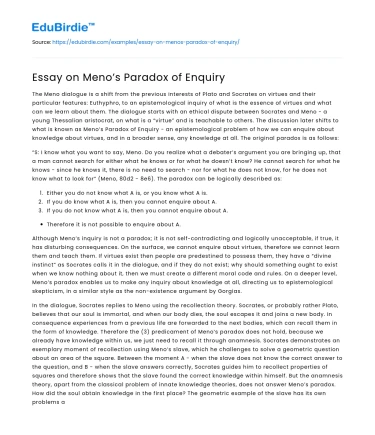The Meno dialogue is a shift from the previous interests of Plato and Socrates on virtues and their particular features: Euthyphro, to an epistemological inquiry of what is the essence of virtues and what can we learn about them. The dialogue starts with an ethical dispute between Socrates and Meno - a young Thessalian aristocrat, on what is a “virtue” and is teachable to others. The discussion later shifts to what is known as Meno’s Paradox of Enquiry - an epistemological problem of how we can enquire about knowledge about virtues, and in a broader sense, any knowledge at all. The original paradox is as follows:
“S: I know what you want to say, Meno. Do you realize what a debater’s argument you are bringing up, that a man cannot search for either what he knows or for what he doesn’t know? He cannot search for what he knows - since he knows it, there is no need to search - nor for what he does not know, for he does not know what to look for” (Meno, 80d2 - 8e6). The paradox can be logically described as:
Save your time!
We can take care of your essay
- Proper editing and formatting
- Free revision, title page, and bibliography
- Flexible prices and money-back guarantee
- Either you do not know what A is, or you know what A is.
- If you do know what A is, then you cannot enquire about A.
- If you do not know what A is, then you cannot enquire about A.
- Therefore it is not possible to enquire about A.
Although Meno’s inquiry is not a paradox; it is not self-contradicting and logically unacceptable, if true, it has disturbing consequences. On the surface, we cannot enquire about virtues, therefore we cannot learn them and teach them. If virtues exist then people are predestined to possess them, they have a “divine instinct” as Socrates calls it in the dialogue, and if they do not exist; why should something ought to exist when we know nothing about it, then we must create a different moral code and rules. On a deeper level, Meno’s paradox enables us to make any inquiry about knowledge at all, directing us to epistemological skepticism, in a similar style as the non-existence argument by Gorgias.
In the dialogue, Socrates replies to Meno using the recollection theory. Socrates, or probably rather Plato, believes that our soul is immortal, and when our body dies, the soul escapes it and joins a new body. In consequence experiences from a previous life are forwarded to the next bodies, which can recall them in the form of knowledge. Therefore the (3) predicament of Meno’s paradox does not hold, because we already have knowledge within us, we just need to recall it through anamnesis. Socrates demonstrates an exemplary moment of recollection using Meno’s slave, which he challenges to solve a geometric question about an area of the square. Between the moment A - when the slave does not know the correct answer to the question, and B - when the slave answers correctly, Socrates guides him to recollect properties of squares and therefore shows that the slave found the correct knowledge within himself. But the anamnesis theory, apart from the classical problem of innate knowledge theories, does not answer Meno’s paradox. How did the soul obtain knowledge in the first place? The geometric example of the slave has its own problems as well, as geometry, or whole mathematics, may be treated as a tautology, and the slave instead of recollecting some “outside” knowledge, deduces his answer from initial axiomatic about properties of squares. Plato’s ontological answer to Meno’s problem may be an answer too complex and hard to prove.
There is a sufficient epistemological response to Meno’s problem, based on the difference between knowledge and true beliefs. Although we may agree to (1), based on the rule of the excluded middle in classical logic, and (2), as it is contradictory to learn anything we already had learned, the third premise is problematic. The (3) is based on the idea of the priority of knowledge (PKW), which states that “If one does not know what F-ness is then one cannot know what F is like, or that anything about F.” But the PKW principle does not imply that we cannot have correct opinions about entities and their features. The most important idea coming from the recollection is that our initial beliefs are true, not false in the first place (Irwin, 1995), which will be later used by Irwin and Fine to prove Meno wrong. In the later passages, Socrates distinguishes knowledge from true belief: “...”; “knowledge is prized higher than correct opinion, and knowledge differs from correct opinion in being tied down.” (Meno, 97e2-98a5), where knowledge is justified, true belief - one that can be explained and argued in favor of. Socrates mentions that someone who has never been to Larissa but has a true, unjustified, belief about where Larissa is, will make as good a guide as anyone who has justified knowledge about the location of Larissa.
We may also argue that the paradox should be interpreted as
- (2) If you do know everything about A…
- (3) If you know nothing about A…
which is a more plausible configuration as it allows the possibility of knowing something about A. This results in distinguishing phenomena and noumena of entity A, where we can know the features of A, but we may have a problem inquiring about its nature (Kant). I think this interpretation of the paradox is much more contemporary and challenging, in comparison to the direct interpretation.






 Stuck on your essay?
Stuck on your essay?

